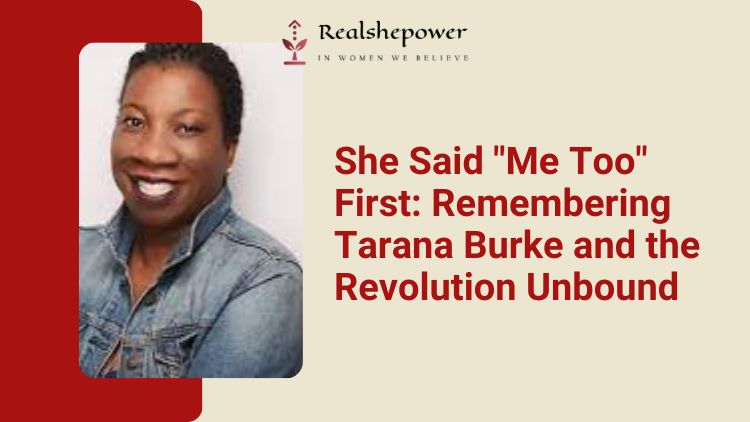From Whispers to a Global Roar: Tarana Burke and the Unbound Power of #MeToo


Summary: This article explores the journey of Tarana Burke, the founder of the #MeToo movement, from its quiet beginnings as a community tool for empowerment to its transformative impact on global conversations about sexual violence. It highlights Burke’s unwavering commitment to supporting survivors, her fight for systemic change, and her call for continued action towards a future free from abuse.
Tarana Burke’s story isn’t a fairy tale crowned with instant success. It’s a gritty tapestry woven with whispers and cries, resilience and rage, ultimately echoing in a global roar that shook the very foundations of power and privilege. A tale worth hearing not just for its dramatic arc, but for the quiet revolution it continues to ignite in the hearts of survivors around the world.
Long before the hashtag trended, a 28-year-old Burke knelt beside a young girl at a summer camp, listening to a confession whispered in the hushed tones of childhood trauma. “Me too,” Burke offered, a simple phrase imbued with an unspoken understanding, a bridge across the isolating chasm of abuse. Those two words, a seed planted in the fertile ground of empathy, would blossom years later into a movement that would topple empires and redefine the conversation on sexual violence.
Key Takeaways:
- #MeToo wasn’t just a hashtag; it was a movement rooted in empathy and collective action.
- Tarana Burke, the heart and soul of #MeToo, remains focused on supporting survivors and dismantling systems of oppression.
- The fight against sexual violence requires ongoing efforts, amplification of survivor voices, and a commitment to cultural change.
- Everyone has a role to play in building a world where “Me Too” becomes a relic of the past.
But the journey wasn’t paved with red carpets and viral tweets. It was a lonely one, initially confined to the underbelly of marginalized communities where stories of abuse often festered in silence. Burke, a community organizer at her core, built safe spaces for survivors to heal, crafting the “Me Too” mantra into a tool for empowerment, a collective sigh of shared experience. “It wasn’t about going public,” she explains, “it was about letting survivors know they weren’t alone.“
But the seed had a life of its own. In 2006, “Me Too” found its way online, a flicker in the vast digital landscape. Slowly, whispers became voices, shared on message boards and personal blogs. Survivors from all walks of life, united by the brutal commonality of abuse, found solace in the echo of “Me Too.” The phrase transcended boundaries, whispering across oceans and social strata, a quiet but persistent rebellion against the culture of silence.
Then, in 2017, a dam broke. Weinstein, Cosby, Spacey – names like thunderbolts shook the Hollywood pantheon, their fall triggered by a deluge of “Me Too”s on social media. The hashtag, dormant for years, became a tidal wave, sweeping away complacency and igniting a global conversation about sexual assault. From corporate boardrooms to small towns, the whispers became deafening demands for justice, accountability, and change.
Related Articles
- Widespread Sexual Harassment at Australia’s Research Camps in Antarctica
- Women at Goldman Sachs reported 75 incidents of sexual assault
- British Royal Navy opens an investigation into reports of sexual harassment on submarines
But Burke, ever the community organizer, stood steadfastly against the allure of celebrity spotlights. She reminded the world that #MeToo wasn’t about Hollywood A-listers; it was about the millions of unheard voices, the everyday survivors still battling stigma and silence. She pushed the focus back to grassroots organizations, advocating for resources, support systems, and most importantly, belief in the power of collective action.
Today, #MeToo’s legacy is etched in shifting legislation, bolstered support systems for survivors, and a new cultural landscape where silence is no longer an option. But Burke’s work is far from over. She continues to champion survivor-centered practices, fight for racial justice within the movement, and dismantle the systems that perpetuate abuse. “It’s not over until survivors are free,” she insists, her voice echoing the quiet roar of millions.
Tarana Burke’s story is not just about “Me Too”; it’s about the unbound power of a woman who refused to let whispers die in the darkness. It’s a testament to the transformative power of empathy, the relentless momentum of shared experience, and the unwavering conviction that a single voice, amplified by others, can rewrite the narrative of survival into a chorus of justice and change.
So, the next time you hear “Me Too,” remember the journey from a whispered confession to a global roar. Remember Tarana Burke, the woman who lit the spark, and the millions who carried it forward, proving that even the faintest whispers can become hurricanes of change when united in the pursuit of a world where “Me Too” is a relic of the past, not a constant echo of the present.
And remember, your voice matters. The revolution continues, one story, one “Me Too” at a time. Speak, heal, amplify, and together, create a world where whispers of pain become symphonies of hope.
